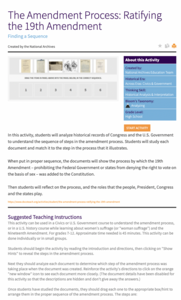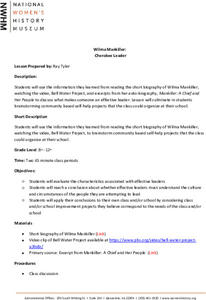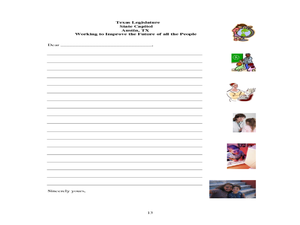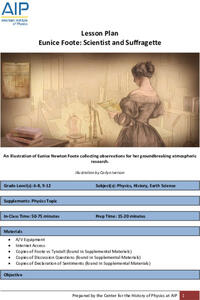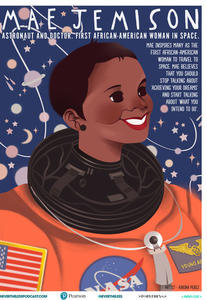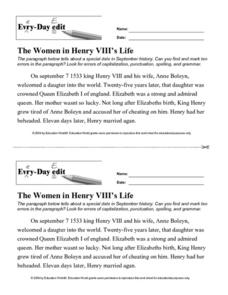DocsTeach
Analyzing a Photograph of Sally Ride
Sometimes, a picture really does say it all. The activity uses a picture of astronaut Sally Ride to help elementary academics make observations and form conclusions. Young historians study the picture, complete short written prompts, and...
DocsTeach
The Amendment Process: Ratifying the 19th Amendment
The process for adding an amendment to the U.S. Constitution is long and arduous, by design. High School historians study a series of documents about the Nineteenth Amendment and, using an interactive program, drag the documents onto a...
Curated OER
Abigail Adams and Thomas Jefferson
In addition to her letters to her husband, family members, and friends, Abigail Adams also wrote to key political figures of the time. In this lesson, scholars examine letters Adams' wrote to and received letters from Thomas Jefferson...
National Woman's History Museum
Wilma Mankiller: Cherokee Leader
Middle and high schoolers consider the characteristics that make for a great leader. For example, they investigate Wilma Mankiller, the first female Principal Chief of the Cherokee Nation. Researchers read a short biography, watch a...
Curated OER
Women in Texas Politics: Winning the Vote, Three Pioneers, and Serving the People
Fourth graders study women's involvement in Texas politics. In this US history lesson plan, 4th graders discuss woman suffrage, examine three Texas female pioneer legislators by reading biographies, and explore women's issues by...
A Mighty Girl
Tu Youyou
Meet Tu Youyou, the first woman from China to win a Nobel Prize. Display a poster of Youyou in your classroom to inspire young scientists to persevere where others have failed. Her discovery of artemisinin to cure malaria has saved...
American Institute of Physics
Eunice Foote: Scientist and Suffragette
The greenhouse effect and climate change are hot topics in today's news. Young scientists may be surprised to learn that the concept is not a new one. In fact, Eunice Newton Foote, scientist, inventor, and suffragette, discovered the...
Curated OER
Abigail at Seventeen
Young historians analyze a letter 17-year-old Abigail Adams wrote to her cousin and identify the aphorism Adams used. Participants select a line from the letter and create an illustration of the aphorism.
Curated OER
Abigail in Mourning
People deal with grief in different ways. The series of Abigail Adams' letters in this lesson reveals how she dealt with losing her mother, father, and community members. The included worksheet helps young scholars identify the tone and...
Curated OER
Abigail and Her Sisters
The 10th lesson in this series has researchers examining a packet of letters from Abigail Adams to her sisters. Scholars note examples of the themes that appear throughout the letters.
Curated OER
Abigail and Mercy
Scholars examine three letters from Abigail Adams to Mercy Otis Warren, compare them to previous letters in the series, and note the change in tone in these letters she writes to her friend.
Curated OER
Abigail as Mother (Part 1)
In part one of a two-part series, scholars compare two of Abigail Adams' letters: one to her son and the other to her daughter. Researchers use the provided worksheets to contrast evidence of the tone and themes in the two letters.
National Woman's History Museum
Gloria Steinem, Feminism and “Living the Revolution"
Excerpts from Feminine Mystique by Betty Friedan and from Gloria Steinem's "Living the Revolution" provide high schoolers an opportunity to study the feminism of the 1950s and 1960s, sometimes called the "Second Wave of Feminism."
A Mighty Girl
Mae C. Jemison
The poster of Mae C. Jemison, the first African-American woman astronaut, challenges young scientists to consider what they intend to do to achieve their dreams.
Digital Public Library of America
Fannie Lou Hamer and the Civil Rights Movement in Rural Mississippi
Good primary resources, offering different perspectives on important issues and events, are hard to find. A packet of 12 primary source images, videos, audio recordings, records, and newspaper articles related to the 1960s civil rights...
Learning for Justice
Maya Angelou
Maya Angelou's poem, "Still I Rise", offers young scholars an opportunity to consider how poets use literary devices to create powerful messages. After a close reading and discussion of the poem, class members reflect on how they can...
DocsTeach
Around the World with First Lady Pat Nixon
Travel the world with the First Lady! Academics study images from Pat Nixon's travels as First Lady to discover her role in Richard Nixon's presidency. Historians match images to world locations, complete a worksheet, and...
Education World
Every Day Edit - The Women in Henry VIII's Life
In this everyday editing activity, students correct grammatical mistakes in a short paragraph about the women in Henry VIII's life. The errors range in capitalization, punctuation, grammar, and spelling.
National Woman's History Museum
Tea with Penelope: A 2-Point Perspective of the Edenton Tea Party
A brief introduction to Penelope Barker sets the stage for a discussion about political cartoons and the persuasive technique used to create them. A graphic organizer aids scholars in the analysis of a piece of work using a 2-point...
National Woman's History Museum
Dolores Huerta: The Life and Work of a 20th Century Activist
Extra! Extra! High schoolers read about Dolores Huerta, the social activist who helped organize the United Farm Workers. Researchers read primary and secondary sources about Huerta's work and craft a headline, supported by three pieces...
National Park Service
Discover the Mary Ann Shadd Cary House
Mary Ann Shadd Cary was an extraordinary woman, no matter the time period. Academics research the life and achievements of Mrs. Cary, who was born a free African American in 1823. The instructional activity uses primary sources,...
Digital Public Library of America
The Poetry of Emily Dickinson
Are you contemplating a poetry study featuring Emily Dickinson? Finding good primary sources to accompany the study can be a challenge—never fear, help is here! Check out this primary source set that includes manuscripts of several of...
Digital Public Library of America
Their Eyes Were Watching God by Zora Neale Hurston
Zora Neale Hurston's novel Their eyes Were Watching God has been highly praised and severely criticized for its depiction of African American folk culture. A set of primary source materials, including photographs, articles, essays, and...
Mr. Nussbaum
Amelia Earhart
Amelia Earhart is the focus of a reading comprehension interactive practice. Scholars read an informational text; then answer 10 questions.
Other popular searches
- Women's History Month
- Women's History of 1960's
- Womens History Month
- Women's History Quiz
- Women's History Music
- Non Fiction Women's History
- Us Women's History
- American Women's History
- Women's History Videos
- Texas Women's History
- Womens History Abigail Adams
- March Women's History Month



